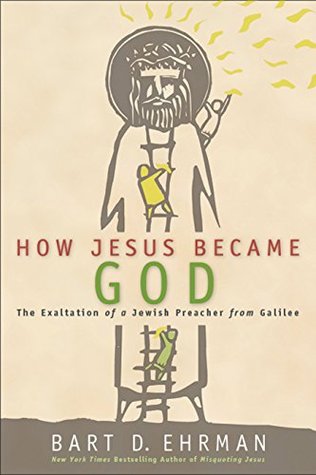More on this book
Community
Kindle Notes & Highlights
Read between
April 18 - April 25, 2023
The problem is that most ancient people—whether Christian, Jewish, or pagan—did not have this paradigm. For them, the human realm was not an absolute category separated from the divine realm by an enormous and unbridgeable crevasse. On the contrary, the human and divine were two continuums that could, and did, overlap.
One of my theses will be that a Christian text such as the Gospel of Mark understands Jesus in the first way, as a human who came to be made divine. The Gospel of John understands him in the second way, as a divine being who became human. Both of them see Jesus as divine, but in different ways.
It will become clear in the following chapters that Jesus was not originally considered to be God in any sense at all, and that he eventually became divine for his followers in some sense before he came to be thought of as equal with God Almighty in an absolute sense. But the point I stress is that this was, in fact, a development.
This is a view that scholars have called henotheism, in distinction from the view I have thus far been calling monotheism. Monotheism is the view that there is, in fact, only one God. Henotheism is the view that there are other gods, but there is only one God who is to be worshiped.
I had become impressed with the fact that the sayings of Jesus in which he claimed to be God were found only in the Gospel of John, the last and most theologically loaded of the four Gospels.
But one thing they all agree on: Jesus did not spend his ministry declaring himself to be divine.
Our very first Christian author is the Apostle Paul, who was writing twenty to thirty years after Jesus’s death.
The problems with Paul are that he didn’t actually know Jesus personally and that he doesn’t tell us very much about Jesus’s teachings, activities, or experiences. I sometimes give my students an assignment to read through all of Paul’s writings and list everything Paul indicates Jesus said and did. My students are surprised to find that they don’t even need a three-by-five card to list them. (Paul, by the way, never says that Jesus declared himself to be divine.)
Scholars typically date the New Testament Gospels to the latter part of the first century. Most everyone would agree that Jesus died sometime around 30 CE. Mark was the first Gospel to be written, probably around 65–70 CE; Matthew and Luke were written about fifteen to twenty years after that, say, 80–85 CE; and John was written last, around 90–95 CE.
And why are they allowed to enter this glorious kingdom? “Because I was hungry and you gave me food, I was thirsty and you gave me drink, I was a stranger and you welcomed me, I was naked and you clothed me, I was sick and you visited me, I was in prison and you came to me” (25:35–36). The righteous are taken aback and don’t understand: they have never done these things for him—in fact they have never even seen him before. The judge tells them, “Truly, I say to you, as you did it to one of the least of these my brethren, you did it to me” (25:40).
He then speaks to the “goats” and sends them away to the “eternal fire prepared for the devil and his angels” (25:41), and he tells them why. They didn’t feed him when he was hungry, give him a drink when he was thirsty, welcome him as a stranger, clothe him when he was naked, visit him when he was sick and in prison. They too don’t understand—they have never seen him before either, so how could they have refused to help him? And to them he says, “Truly, I say, to you, as you did it not to one of the least of these, you did it not to me” (25:45).
And it almost certainly is something very close to what Jesus actually said. And why? Because it is not at all what the early Christians thought about how a person gains eternal life. The early Christian church taught that a person is rewarded with salvation by believing in the death and resurrection of Jesus.
Jesus’s followers must have considered him to be the messiah in some sense before his death, because nothing about his death or resurrection would have made them come up with the idea afterward. The messiah was not supposed to die or rise again.
Belief in the resurrection is what eventually led his followers to claim that Jesus was God.
the book of Acts was written by the same person who wrote the Gospel of Luke.


